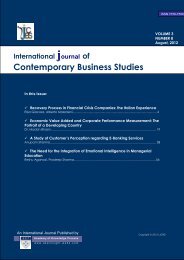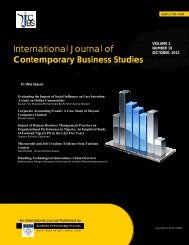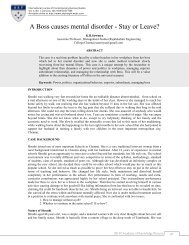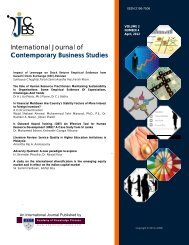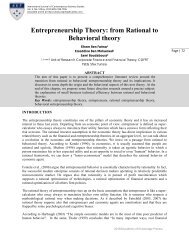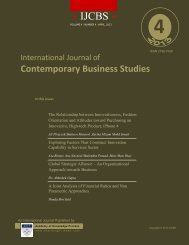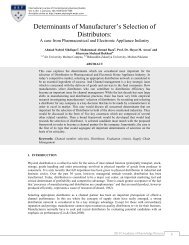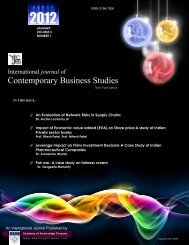Contemporary Business Studies - Academy of Knowledge Process ...
Contemporary Business Studies - Academy of Knowledge Process ...
Contemporary Business Studies - Academy of Knowledge Process ...
Create successful ePaper yourself
Turn your PDF publications into a flip-book with our unique Google optimized e-Paper software.
International Journal <strong>of</strong> <strong>Contemporary</strong> <strong>Business</strong> <strong>Studies</strong>Vol: 4, No: 2. February, 2013 ISSN 2156-7506Available online at http://www.akpinsight.webs.comThe Institute <strong>of</strong> Chartered Accountants <strong>of</strong> India (ICAI) has taken the challenge <strong>of</strong> training some CharteredAccountants to become Certified Forensic Accountants (CFAs). It is providing a “Certificate Course onForensic Accounting and Fraud Detection using IT and CAATs,” with 100 hours spread over 6 weekends.This challenge is yet to be embraced by most <strong>of</strong> the Indian Universities providing higher education. Atpresent, very few academic institutions are <strong>of</strong>fering a full course on forensic accounting, either atundergraduate or graduate level, despite the high need for this category <strong>of</strong> pr<strong>of</strong>essionals. For example,Indiaforensic (Pune) is one <strong>of</strong> the few, which conducts a Certificate course in Bank Forensic Accounting(CBFA), Certified Anti Money Laundering Expert (CAME), and Certified Forensic AccountingPr<strong>of</strong>essional (CFAP). The Institute <strong>of</strong> Chartered Financial Analysts <strong>of</strong> India University (Tripura) also<strong>of</strong>fers a “Postgraduate Diploma in Forensic Accounting.” However, some colleges/universities areproviding “Forensic Science” courses in India. Most probably, this is on account <strong>of</strong> lack <strong>of</strong> informationabout universally accepted skill-mix <strong>of</strong> FA’s. Both academics and pr<strong>of</strong>essionals should agree on therequired skill-mix <strong>of</strong> FA’s, which could be embedded in their course structure. This scenario highlights agap between forensic accounting practice and education in the country. As academic institutionscontemplate the addition <strong>of</strong> fraud and forensic accounting into their curricula, there is a need for an indepthexamination <strong>of</strong> the knowledge, skills and abilities necessary for individuals to function in thesefields. In spite <strong>of</strong> the fact that forensic accounting is <strong>of</strong>fered by some pr<strong>of</strong>essional accountancy bodiesand Universities in the United States, Canada, United Kingdom etc., controversies are still looming theacademic environment on the best skills needed for this crucial function. The international academiccommunity has tried to address the question: who are the right people to suggest forensic accountingskills?This paper is organized as follows. Section 2 briefly summarizes the creative and fraudulent accountingpractices followed by some <strong>of</strong> the Indian companies. In the current reporting environment, FA’s are ingreat demand for their accounting, auditing, legal, and investigative skills. Therefore, section 3 highlightsthe need for forensic accounting and the skills required on the part <strong>of</strong> FA’s. The review <strong>of</strong> literature thatmotivates this study is performed in section 4. Section 5 discusses the methodology and procedures usedin gathering and analyzing the survey data for the study. Section 6 presents the results and discussion <strong>of</strong>the implications <strong>of</strong> the study. Last section summarizes the conclusion.Fraudulent and Creative Accounting Practices Used by the Indian CompaniesFraudulent financial reporting, no doubt, can have significant consequences for the organization and itsstakeholders, as well as for public confidence in the capital markets. Periodic high-pr<strong>of</strong>ile cases <strong>of</strong>fraudulent and creative financial reporting in India have raised concerns about “the credibility <strong>of</strong> thefinancial reporting process and called into question the roles <strong>of</strong> management, auditors, regulators, andanalysts, among others.” India has been amongst the fastest growing economies in the world in the lastdecade. In spite <strong>of</strong> global economic slowdown, the Indian economy grew by 8 per cent in 2010–11 and isestimated to grow by 7 per cent in 2011–12. There is significant foreign investor interest as shown by a50 per cent increase in FDI this year. Fortunately, it has remained relatively unaffected by the globaleconomic crisis, thanks to strong fundamentals <strong>of</strong> the economic policy. However, despite this situation“the confidence <strong>of</strong> international investors and domestic entrepreneurs has been low in the last two years,thanks to the various scams and frauds that have come to light during this period.”The frauds in the ‘Indian financial markets’ have been known for many years. According to CapitalViaGlobal Research Ltd. (www.capitalvia.com), “The following are examples <strong>of</strong> some <strong>of</strong> the popular IndianFinancial Market Scams (losses suffered): 1992 Harshad Mehta Securities Scam (Rs. 5,000 crores), 1995Bhansali Scam (Rs. 1,200 crores), 2001 Ketan Parekh Scam (Rs. 1250 crores), 2001 The UTI Scam (Rs.4,800 crores), 2008 Satyam Scam (Rs. 10,000 crores), 2008 The 2-G Spectrum Swindle (Rs. 60,000crores), 2009 Madhu Koda Scam (Rs. 4,000 crores), etc. etc. Fruad committed by the Satyam ComputerServices Ltd. has been labeled by the media as “India’s Enron.” Some other popular scams were: Indian2013©<strong>Academy</strong> <strong>of</strong> <strong>Knowledge</strong> <strong>Process</strong>59



